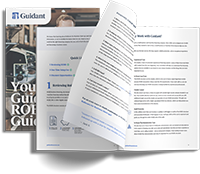Can you set up a C Corp to run LLC? Yes!
Choosing your business structure type is a crucial decision for small business owners. Your business entity type affects several big factors in your business, including flexibility, ease in securing funding, the level and type of taxation, protection from personal liability, and more. That’s why your entity type needs to align with your business and goals.
Generally, any given business will choose one common type of business structure:
- Limited Liability Company (LLC)
- Partnership
- Sole proprietorship or a corporate structure (such as a C Corporation or an S Corporation)
But what happens if you already have an LLC and want to create a C Corp? Do you want to keep an LLC’s advantages while also benefiting from establishing a C Corp?
There are many reasons you might want to create a C Corp. For example, a C Corp is required to use some advantageous funding methods, such as Rollovers for Business Start-ups (ROBS).
The good news? You can maintain an existing LLC within a C Corp — or create one to be purchased and run by a C Corp!
Before we jump into how to set up a C Corp to run LLC, let’s briefly break down each of these business structures and examine their advantages and potential drawbacks.
What are Limited Liability Companies (LLCs)?

An LLC protects business owners from personal liability in case of debts or other liabilities. Since an LLC is relatively new, the IRS doesn’t have a specific tax category for this business entity type. That means an LLC uses tax categories of other business types.
A single-member LLC is taxed as a sole proprietorship. If there are multiple members, the pass-through taxation is at the same rate as partnerships. (LLC owners are called members.)
An LLC’s profits or losses are passed through to the members, who then pay via personal tax returns. (An LLC is considered a pass-through entity.) So, LLCs can avoid paying certain taxes, like corporate franchise taxes.
LLCs are relatively simple to set up, and almost any individual or entity can do so. But there is one notable exception: Banks and insurance companies are not legally allowed to be LLCs. Regulation takes place through the individual states.
Want to learn more about LLCs? See our LLC 101: What You Need to Know About Limited Liability Companies.
What are C Corporations (C Corps)?

A C Corp also protects business owners from personal liability in case of corporate-level liabilities. That means your income and any of your personal assets in the C Corp, such as equity, are protected.
Additionally, C Corps protect investors in the company and other stock owners from liability.
That means the company’s investors and other stock owners can’t be personally pursued for liability. However, they could lose any personal asset they have invested in the event of a liability, such as bankruptcy.
A C Corp is a legal entity taxed as a business entity at a corporate tax rate. Employees of a C Corp also pay personal taxes on any salary or other income (such as dividends) they receive from it. This tax structure is often referred to as “double taxation.” But “double taxation” doesn’t mean C Corps pay more taxes than other business types!
Actually, C Corps can offer multiple tax advantages that other business entities don’t, such as the ability to reinvest company profits at an advantageous rate.
C Corps are a more complicated structure than an LLC. They must have, for example, a Board of Directors, an annual meeting, and bylaws. (Note: C Corps can be held publicly or privately.)
See our comprehensive C Corporation Series: What is a C Corp? to learn more about C Corps!
Advantages of LLCs
So what are the advantages of LLCs? The protection from personal liability and relative ease of forming one are advantages for many business owners.
In most states, establishing an LLC requires articles of organization and filing fees regularly. It’s also easier — and often faster — to set up an LLC than a C Corp. Why? An LLC has fewer requirements than C Corps.
C Corps requires a business structure, a Board of Directors, bylaws, and more. While these requirements can be beneficial to your business, meeting all of them can take more time and effort.
LLCs also have unique taxable income advantages. For one, LLCs pay only personal income taxes and avoid corporate taxes. Secondly, LLCs also offer a 20 percent tax deduction — if your income is below a certain amount in your individual tax return.
Decision-making in an LLC can also be more direct and quicker than in a C Corp because approval from a Board or shareholders isn’t required. But business owners may still need approval from other members.
Advantages of C Corps
C Corps also offers the advantage of personal liability protection — with the added advantage of also providing limited liability protection for investors.
But a C Corp offers more than limited liability protection or legal protection. One of the biggest plus sides of a C Corp for business owners is that they offer a broader set of funding opportunities than LLCs and other structures.
For example, if you want to attract investors through issuing stock, you can — with no cap on the number of investors. You can’t do this with an LLC.
An LLC can’t issue stock at all. While an S Corp can issue stock, it’s limited to just 100 investors. But C Corp has no stock limitations. (Keep in mind that a C Corp must file with the U.S. Securities and Exchange Commission once certain revenue levels and a number of shareholders are reached.)
C Corps also have more financial benefits. For example, you can utilize 401(k) Business Financing, known as Rollover For Business Startups (ROBS). ROBS allows you to transfer capital from your retirement funds from qualified accounts, such as 401(k)s and Individual Retirement Accounts (IRAs), to your business.
Since you have complete control of your own retirement funds, ROBS provides maximum flexibility for business financing. You can use ROBS as the sole funding source for your business — or combine it with other business financing methods, such as a business loan.
ROBS also allows business owners to avoid or minimize drawbacks associated with other funding sources. Why?
ROBS isn’t a loan. Loans can saddle companies with debt, ultimately making it difficult to grow the business, especially for startups. Lenders may also require creditworthiness standards, collateral, and history or standing in business leadership that businesses may find challenging to meet. Stock issuance is complicated. The shareholders have equity, giving them certain rights in business decisions.
To utilize ROBS, you must set up your business as a C Corp because of government transaction requirements around qualified employer securities (QES). Using ROBS also allows you to avoid the Internal Revenue Service (IRS) taxation and penalties that would kick in when you access your retirement funds early.
In addition, a ROBS setup creates a new retirement plan that both you and your employees can invest in.
C Corps can also offer tax advantages. For example, the corporate income tax rate can be lower than that of an S Corp.
C Corps allow a business to “income split,” a process that allows both business profits and losses to be split between the business and the owners.
The C Corp legal structure allows for maximum business growth. You must have a Board of Directors and host board meetings, which can help you find high-level business advice and mentorship. If your ultimate goal is to be a larger business or a leader in your sector, a C Corp is the structure most likely to get you there.
Finally, C Corps may offer more ease in transitioning from an ownership role. Transitioning from an LLC requires the agreement of all members, and the LLC may have to be dissolved if all members don’t agree. But a C Corp exists as a separate entity from a specific founder or owner.
If you’re in a leadership role, you may need the Board’s approval for a transition plan. But you won’t need to dissolve the business. If you foresee selling your business or retiring in the future, a C Corp might be the better choice.
Disadvantages of LLCs and C Corps
All business structures have advantages and disadvantages. LLCs and C Corps are no different. But any specific drawback of an LLC or C Corp largely depends on your business goals. So, ask yourself: Which entity type best fits your business plan — and which entity type could benefit your business the most?
Remember that you can’t participate in funding methods such as stock issuance or ROBS in an LLC. That may not be a problem if you don’t foresee a need for these funding methods. But if you want to access more types of business financing, an LLC structure can be a drawback.
C Corps are more complicated than LLCs. All corporation types, like C Corps and S Corps, require you to follow corporation laws and pay federal taxes. That means your business is far more subject to regulation with a C Corp from both state and Federal authorities. You may have less flexibility in management decisions, and decisions may take longer. You might see this as a drawback if you want to run quick, hands-on business operations.
LLCs and C Corps are taxed very differently. So, to ensure you choose the right entity type for your business, you may want to discuss the tax implications and savings with tax professionals!
C Corp to Run LLC: Can You Have Both Entity Types?

If you want a C Corp and an LLC, you can! A C Corp can own and run an LLC. To create a C Corp as an existing LLC member, you can establish the C Corp and consult an attorney about purchasing the LLC.
But suppose you see more advantages to an LLC for the initial stages of your business — and want the flexibility of moving to a C Corp structure. In that case, you can create a transitioning plan from an LLC to a C Corp. Remember: You can always change your business entity type!
C Corps usually own an LLC when their products or projects differ. A C Corp may own an LLC for a joint venture, for example, or a subsidiary or operating unit for a different product.
The company structure is also used to set up separate operating and holding companies or to take advantage of venture capital funding for a particular product.
These choices and processes can be complicated. It’s a good idea to consult experienced lawyers and accountants about your business structure choice. You also may want to get their professional opinion on the timing of your business registration and setting up your C Corp to run LLC.
Guidant Financial Can Help
Are you interested in maximizing the funding opportunities for your small business? We help small businesses of all types use 401(k) Business Financing as both a flexible funding source and as a down payment for loans. We also provide step-by-step help with establishing a C Corp — and make the process as easy as possible! Contact us today to discuss your business with our consultants.

















